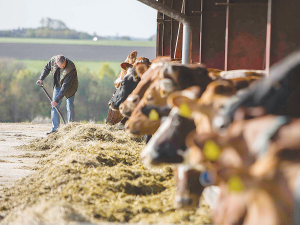Tone deaf?
OPINION: Your old mate can't believe the absolute brass neck of the directors at Beef + Lamb NZ who are asking levypayers for a hefty increase in directors fees at the time of record low red meat prices.
 Under the buy-out scheme, the Government will buy the businesses of Dutch livestock farmers who are categorised as ‘regular’ or ‘peak’ polluters.
Under the buy-out scheme, the Government will buy the businesses of Dutch livestock farmers who are categorised as ‘regular’ or ‘peak’ polluters.
While New Zealand seems to be treading water on the subject of pricing emissions and the future of He Waka Eke Noa (HWEN), pending a new government, the Netherlands has been clearer on its proposed farm buy-out scheme, as part of its effort to reduce nitrogen emissions by at least 55% by 2030.
However, negotiations to reach an overall agreement on the future of the Dutch agricultural sector broke down in mid-2023. The government spearheading the process has since dissolved, so while the voluntary buy-out scheme is now available for farmers, it will be up to a future government to devise new, additional measures should this not be enough to meet reduction targets.
Under the buy-out scheme, the government will buy the businesses of Dutch livestock farmers who are categorised as 'regular' or 'peak' polluters.
The purchase price will be between 100 to 120% of the value of their business, with the farmer still able to retain the land. In return, those farmers must permanently reduce nitrogen emissions on the land by up to 85% and are not permitted to continue the farming business in the Netherlands or elsewhere within the European Union.
Looking at the scheme in more detail, following approval from the European Commission, the plan is to buy out livestock farms near protected nature areas, targeting two categories for farmers volunteering to be bought out. "Peak polluters" are set to receive 120% of the value of their business' while "regular polluters" will receive 100% of the value of their business.
There is a technical calculation to determine what category a farm falls into that includes total nitrogen leakage as well as proximity to protected nature areas. There is no published list as such, although it is understood that there are about 3,000 farms in the 'peak polluter' category and approxmately 8,000 farms in the 'regular polluter' classification.
In parallel to the farm buy out scheme, the government was also negotiating an Agricultural Agreement with the farming sector on its future in the Netherlands. A key sticking point concerned a proposed regulation to increase extensification of farming operations, in particular, the limit on the number of livestock per hectare.
Extensification refers to the process in which the same number of livestock is spread over a larger area of land, reducing the pressure on the farmland.
That pressure is driven by the amount of fertiliser used on the land, that in turn might leach into nearby rivers and creeks and have adverse effects.
When launched in June 2023, Dutch Minister for Nature and Nitrogen Christianne van de Wal warned farmers that "there will be no better offer hereafter".
OPINION: The recent Federated Farmers / Rabobank 2024 Farming Salaries Report revealed strong growth in farm salaries over the past two years.
The low unemployment environment is one of the key factors driving on-farm salaries higher over the past 24 months, says Rabobank general manager for country banking Bruce Weir.
Fonterra has appointed a new chief financial officer, seven months after its last CFO’s shock resignation.
A seminar on rural dispute resolution has been organised at Lincoln University, Christchurch this month.
The legacy of Dr Peter Snow continues to inspire as the recipients of the 2023 and 2024 Peter Snow Memorial Awards were announced at the recent National Rural Health Conference.
One of Fonterra’s global customers, Mars is launching an ambitious sustainable dairy plan to work with dairy farmers and cut emissions by 50%.